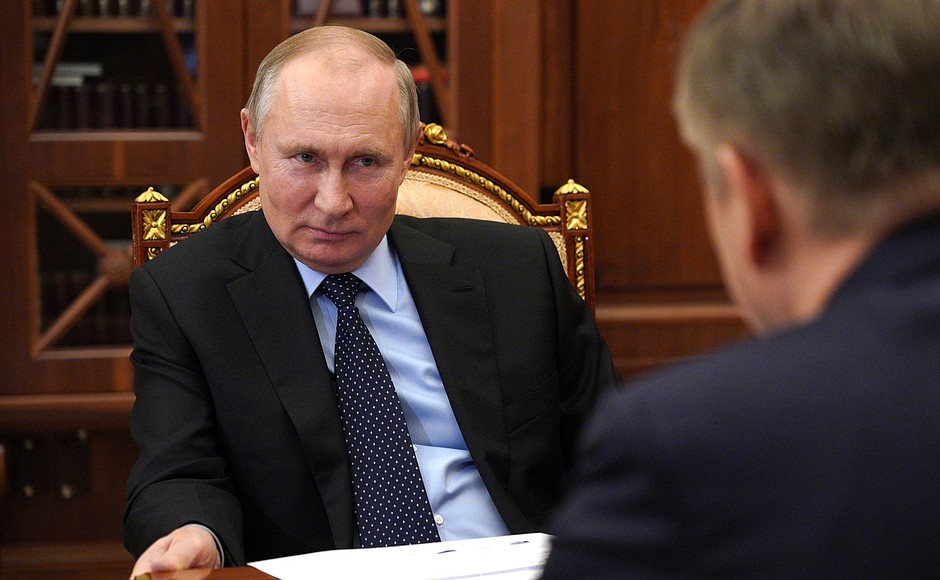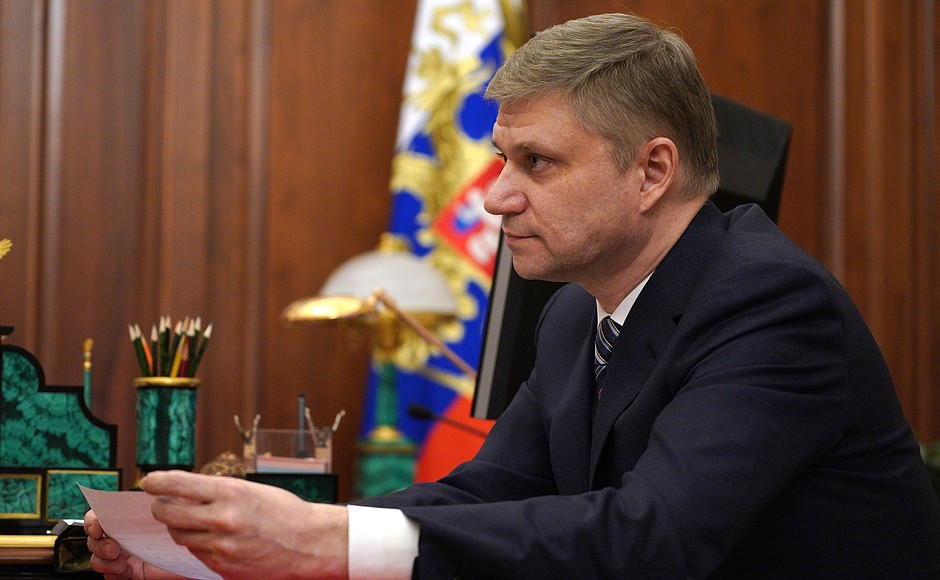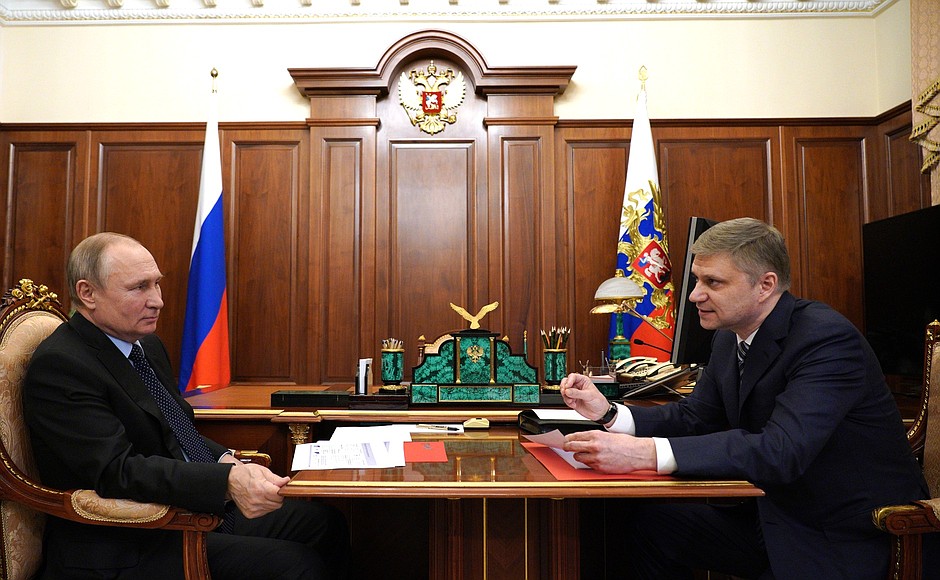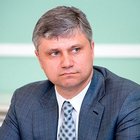President of Russia Vladimir Putin: Mr Belozerov, let us begin with the company’s results in 2020 and then talk about this year’s operations and specifically passenger transportation.
Russian Railways CEO Oleg Belozerov: Mr President, we have summarised our results and I would like to thank you for your continuous attention and support of the railway industry.
Last year being rather extraordinary, we expected disappointing results; however, the decline in operations was only 2.7 percent while cargo turnover decreased even less, by 2.2 percent.
How did we manage that? First of all, thanks to our best practices and some new solutions. We made 70 targeted decisions on reducing rates, and our cargo shippers saved more than 20 billion rubles.
Secondly, we shifted to digital logistics. Now, almost 80 percent of our document flow is managed electronically. Last year, our customers did not have to visit our offices and could quite easily complete their paperwork remotely.
Vladimir Putin: So you eliminated the red tape.
Oleg Belozerov: Yes, we did our best. We can now see remarkable results.
Thirdly, last year we noticed that our multi-purpose approach worked as follows: we used open freight cars to carry sand, coal…
Vladimir Putin: Can you load them with containers on the way back?
Oleg Belozerov: We are actually discussing this option. This is a very professional question. My colleagues and I are currently trying to find an answer to it. We do not want to impinge upon our operators, though. Some of them have more open cars while others use more rail platforms. Obviously, this depends on the tariff load.
Vladimir Putin: They practiced that in the Soviet time. Why move empty cars around?
Oleg Belozerov: Mr President, we are now discussing this on the Government's platform. I think that we will carry this through. At the same time, the number of containers in transportation has reached a record 5.8 million, this is an absolute record. At the same time, we are now using Flexitanks, liner bags, and open top containers, and we even transported coal in containers last year. I mean, just to imagine a few years back that this is what it would be like…
Vladimir Putin: Coal in containers?
Oleg Belozerov: That is right. Open top containers are not closed. Moreover, there are other advantages. Mainly because we cross the border with China, and there is no need to handle, unload, reload into another wagon. You just move the container, and it moves on, this is much more convenient…
Vladimir Putin: Move to a different track.
Oleg Belozerov: Yes. It is much more convenient for our colleagues and is much quicker. At the same time, we have met all the targets. The average speed of a container in transit in the Russian Federation is over 1,050 kilometres per day.
Vladimir Putin: What is the speed per hour?
Oleg Belozerov: The average section speed is about 43 kilometres per hour – it is a railway term. The values are actually growing, and we are in the top three railways in terms of travel speed. In Europe, for comparison, cargoes travel at 200–250 kilometres per day, but in Russia, 1,050.
Moreover, the volume of transit from China increased by more than 50 percent last year, mainly container transit, because the coronavirus restrictions, as it eventually turned out, and paperless workflow have given an edge to the railway. There was more rail cargo, and we were able to take advantage of this.

Vladimir Putin: What border crossings do we use?
Oleg Belozerov: Zabaikalsk, Grodekovo, and Kamyshovaya. We also border on Mongolia, so we have transit through Mongolia. But we mainly rely on our international agreement, the one you have accepted, between Kazakhstan, Russia and Belarus. This covers the main route, the shortest and the fastest, so we carry the bulk of the cargo along that route.
We have posted unique results on the Eastern Operating Domain. The Russian economy is facing the East more actively, all parameters have been surpassed, the east-bound freight traffic rate has increased by 2.5 percent, and port shipments are up 8.5 percent.
We have also fulfilled your instruction on delivering 53 million tonnes of coal from Kuzbass, and we have accomplished a very difficult task assigned in your Executive Order, that is, transporting 144 million tonnes of all types of consignments via the Eastern Operating Domain.
Vladimir Putin: How much did Kuzbass want to ship out?
Oleg Belozerov: Mr President, your latest instruction, received by us, stipulates a 30 percent increment in 2024. We envisage 53 million tonnes this year, plus five in 2022 and five more in 2023, and we will attain 68 million tonnes or plus 30 percent, as per your instruction.
Vladimir Putin: How will you accomplish that?
Oleg Belozerov: First, construction volumes also indicated in the comprehensive infrastructure modernisation plan.
Vladimir Putin: How much do you need to eliminate the bottlenecks from the Eastern Operating Domain? What did you decide, in the long run?
Oleg Belozerov: The second stage requires 720 billion rubles. Considering the first stage, we need 850 billion rubles to complete all this work. We will attain 144 million tonnes this year, as well as 158 million in 2022, 173 million in 2023 and 180 million tonnes in 2024. We have to transport these volumes under your Executive Order.
Vladimir Putin: You should closely monitor construction prices. I will issue the relevant instruction to the Federal Anti-Monopoly Service, and I am asking you to follow this aspect, too.
Oleg Belozerov: Thank you very much. We can now see multi-vector aspects, but we are trying to sign and will now sign contracts for the entire cycle. As we can make timely payments, we believe that this is good news for the builders who can arrive, deploy and have a clear idea of …
Vladimir Putin: Of course, they are confident that payments will be made. These are excellent working conditions.
Oleg Belozerov: Yes, we will certainly monitor this process.
Vladimir Putin: Mr Belozerov, that tunnel…
Oleg Belozerov: Severomuysky.
Vladimir Putin: Severomuysky. Would it be possible to bypass the tunnel from the west towards the ocean?
Oleg Belozerov: Mr President, in fact, we are exploring this possibility; what is more optimal: one more tunnel or…
Vladimir Putin: Either cut it through, or build a bypass.
Oleg Belozerov: Yes, or a bypass should be built. However, we think that it should be done at the third stage because the indicators that I told you about will only be achieved at the second stage. As for the third one, pursuant to your instruction we are preparing such a programme until 2030 and even 2035, and the work is moving eastward; we see a permanent demand. I suppose that we must ensure about 15 years of active construction work, which is important and needed in the Far East, including the construction of tunnels. It is the Baikal–Amur Mainline that will give …
Vladimir Putin: Or a bypass?
Oleg Belozerov: Either a tunnel or a bypass. Yes, it is the Baikal–Amur Mainline that can give now the biggest increase in freight traffic from the West to the East.
Vladimir Putin: Yakutia should not be overlooked, because they do not even need a tunnel there and they are closer to the ocean as well.
Oleg Belozerov: Mr President, as soon as your instruction was issued with regard to Yakutia, we had a discussion with the Ministry for the Development of the Russian Far East and Arctic, and we had a discussion at the governmental level, with the Prime Minister. The amount of cargo grew significantly after the discussions, consignors want to transport cargoes and develop more actively.
We are going to draw up a special programme on the development of the Yakutian [coal] cluster by September 1 in order to send it to the nearest ports, including Vanino, and possibly to Primorye Territory.

Vladimir Putin: I ask you to work closely with the business community and consignors, and with heads of the regions: Kuzbass, Kemerovo and Yakutia. Because all of these regional heads contact me all the time. Naturally, they need to make plans, including those in the social sphere.
Oleg Belozerov: Mr President, we will try to meet the demand in full now, working in close contact, including by drafting special regulations and increase the throughput capacities, so that the Government can regulate access to the infrastructure in different regions by setting the right priorities. We are working on this now and, I am sure, we will carry it through.
Vladimir Putin: Yes, I spoke about the construction projects with Deputy Prime Minister Khusnullin. And you are the customer there, aren’t you?
Oleg Belozerov: Yes.
Vladimir Putin: I ask you to organise this work in due manner, so that the auctions for the land plots are conducted at a good, professional, market level and the best contractors, which offer the best projects in terms of quality, construction time and price, are selected.
Oleg Belozerov: We are doing this work additionally together with the Government and Mr Khusnullin, in order to create a mechanism involving both the regions and a large number of departments to be able to address all issues quickly.
Vladimir Putin: They also have their own companies there, construction companies, and they should also be involved.
Oleg Belozerov: Yes. In doing this we expect the scope to be much greater and the local companies will participate too. Moreover, in a longer-term perspective it will be a good job for them. We believe there will be an opportunity to expand the scope of construction.
Vladimir Putin: Good.
Oleg Belozerov: Mr President, the biggest problem we encountered last year, as you have said correctly, concerned the operation of the passenger segment. It was probably one of the most difficult years for railways; traffic plunged four-fold in April and May.
Vladimir Putin: Of course, people stopped travelling.
Oleg Belozerov: Exactly. Last year, we transported 872 million people, a decline of 27 percent compared to 2019. But we did not waste time. We cooperated with railway carriage producers, buying a record large number of carriages, over 1,000, or more precisely 1,050 rail cars.
Vladimir Putin: Who is your main supplier?
Oleg Belozerov: It is first of all the Tver Carriage Works (TVZ). We have renovated our unique train route from Moscow to Vladivostok. It has 210 new carriages now.
Vladimir Putin: [First Deputy Prime Minister] Belousov told me about the performance of the Tver Works during our recent meeting.
Oleg Belozerov: Very good. Moreover, we are presenting a new line of carriages every year. This has become a tradition, and the past year was no exception in this sense.
Vladimir Putin: The quality is improving. These modern carriages are more comfortable for passengers.
Oleg Belozerov: Quite so. Moreover, Mr President, we have held talks with our French colleagues, who visited Russia and asked us to take them to the Tver Carriage Works because they are resuming night trains. Their priority was previously high-speed day trains, but now they are resuming night trains, and the Tver producers have a clear advantage in this field.
Vladimir Putin: Let them buy such trains from us.

Oleg Belozerov: Yes, we are discussing the matter now.
At the same time, last year, we completely renovated the rolling stock on Sakhalin. We have changed the gauge, as I have already reported to you, and the new carriages are all domestically manufactured.
We did not waste time last year: we launched 20 new commuter routes. And we also paid attention to passenger services, including at train stations, so that now we offer new services.
We paid particular attention to the services for mobility impaired people. Over 1,500 facilities have been equipped to provide such services now. This year we plan to complete this system-wide project, which includes over 900 facilities, including railway stations, as well as 8,000 station stops.
Railway tourism is developing rapidly. The daily steam locomotive service between Sortavala and Ruskeala Park received an award last year. We arranged direct services from Moscow and St Petersburg, which are extremely popular.
In winter, we offered skiers special multimodal services. They could buy a single ticket for two modes of transport and pay special fares.
Vladimir Putin: Are those north-bound trips?
Oleg Belozerov: They run all over the country, Mr President. There is the Majestic North (a five-day trip), services to Karelia, Arkhangelsk, Vologda Region, Sheregesh (Kuzbass), the Khibiny Mountains, Khvalynsk (Saratov Region), Abzakovo (Bashkortostan), etc. New tourist trains on weekends (three days) are also available and hugely popular. We are committed to providing great service.
The year 2020 was unique in terms of investment. Thank you so much for supporting the financial mechanism of issuing perpetual bonds. We invested 717 billion rubles under the investment programme.
Vladimir Putin: It was the Finance Ministry that supported you.
Oleg Belozerov: Thank you very much. It is the biggest investment programme since the company was founded. We purchased 570 locomotives and 373 multiple-unit trains. We built 417 km of new rail tracks and completed a record amount of construction work. All these funds came back to the economy as we both supported labour teams and upgraded our own resources. So thank you very much.
As far as operations go, we have accomplished outstanding results in terms of reliability and cargo delivery. More than 99 percent of cargo orders were delivered on time. We also exceeded the safety index by 15 percent against the planned figure. I would like to stress once again that Russian Railways is the safest railway in the world.
Vladimir Putin: I have a follow-up question: what was the amount of rail tracks, in percentage terms, that required maintenance in 2018 or, say, 2019?
Oleg Belozerov: Around 20–25 percent. In kilometres, that would be 24,000 km in 2019 and 23,900 km in 2020. We reduced the length of outdated tracks.
However, there are still tracks that require maintenance so we have made certain transformations. What does that mean? We have tracks for different traffic density: class one, two, three and four. Maintenance of the first and second class tracks with the highest traffic density is our priority. These are our mainline railways. For classes three and four, we are developing new service mechanisms and also performing maintenance.
The amount of outdated tracks will increase according to the 2021 investment programme because we are allocating significant funds for construction. We were also instructed to review the revenue under the programme by May and make sure we prevent an increase in the amount of outdated tracks – or even reduce it. I think by May we will prepare respective proposals and submit them to the Government in order to reduce the wear and tear.
Vladimir Putin: This is a very important matter, and it is directly related to safety. The target figures need to be achieved of course, not by revising various standards of repairs, but by improving quality. Do you understand what I am talking about?
Oleg Belozerov: Mr President, this is exactly what we are doing.
Vladimir Putin: We can move these deadlines indefinitely. You need to approach this very carefully.
Oleg Belozerov: You are absolutely right. We are not moving any deadlines, but we are changing technologies.
First, new materials are now available. We have already requested our manufacturers, for example, those that supply rails. Previously, the warranty period was 700 million tonnes per gross kilometer; now it is 1.4 billion. So we asked them to make it 2.1 billion – tracks will require fewer replacements, and not so often, because repairs definitely jam the infrastructure and we simply cannot move the goods through.
We are very scrupulous about and attentive to safety matters. We have revised each of the elements – I have just cited rails as an example, but there are also fasteners and sleepers – we just revised this infrastructure life cycle specifically to accommodate the new technologies. Five or six years ago, other technologies were used, and today, we are moving forward. We are reducing delays not through redistribution, but through the use of new technologies and new materials that are clearly certified.
Vladimir Putin: Mr Belozerov, you and I perfectly understand and bear in mind, especially you as the head of one of our backbone companies, how important this industry is for Russia. This is not just a company, but a whole industry, and how vital it is for Russia and its economy.
Overall, despite the difficulties we faced last year, the company met its tasks and addressed the problems it encountered, went through the difficulties, and emerged unscathed. I would like to thank you for this. I hope that all the sensitive issues that we have been dealing with in recent months will be carefully considered further on, and all the company's development plans will be implemented in accordance with the agreements reached at the government level.
Oleg Belozerov: Mr President, I would like to assure you that Russian Railways will fulfill all the plans in a timely manner.
Vladimir Putin: Thank you.
